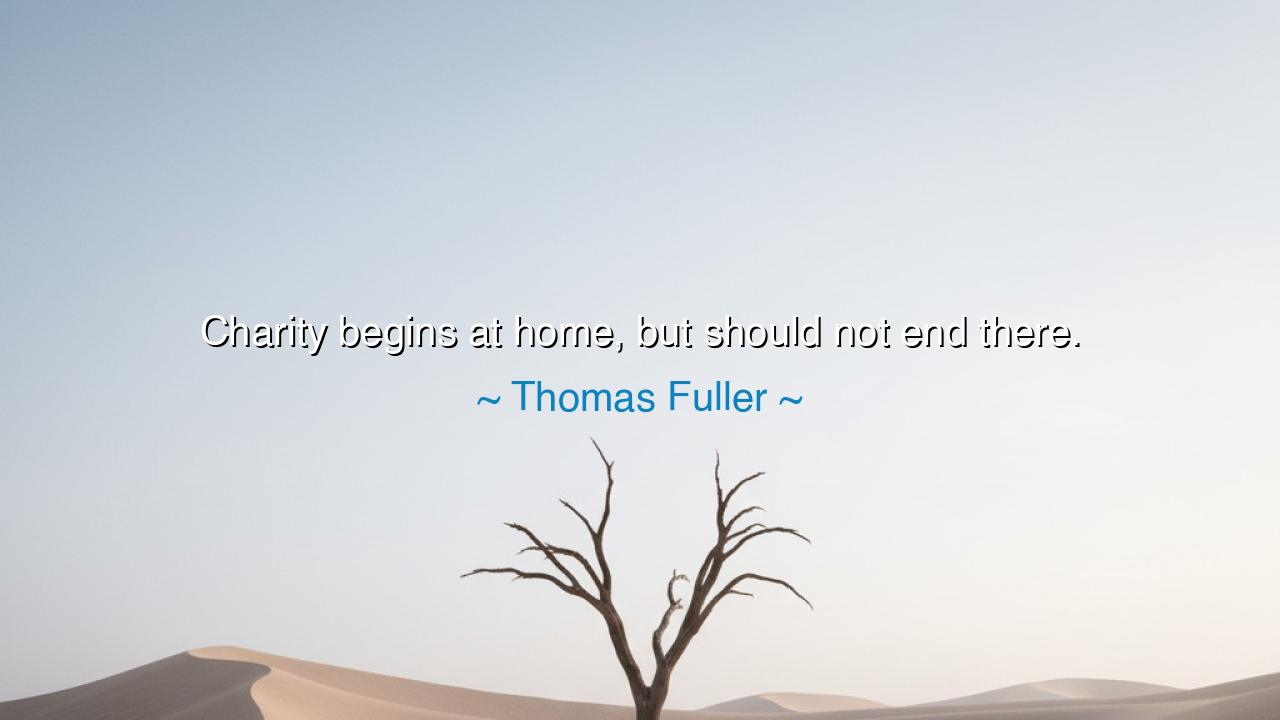
Charity begins at home, but should not end there.






“Charity begins at home, but should not end there.” Thus spoke Thomas Fuller, a wise English clergyman and historian of the seventeenth century, whose words have endured through the centuries as both gentle counsel and moral command. In this simple saying lies a deep truth about the nature of compassion — that it must first be nurtured within one’s own walls before it can flow outward to the world. Yet Fuller warns that true charity, true love, is not a fire meant to warm only the hearth; it must also be a light that shines beyond the home, touching the forgotten, the distant, and the broken.
To the ancients, charity was not merely giving of wealth, but giving of the heart — the will to ease suffering, to lift another soul from despair. Fuller’s wisdom reminds us that love and goodness must have roots before they can have wings. A man who cannot be kind to those nearest him — his family, his friends, his neighbors — cannot claim to love humanity. The home is the first school of virtue, the first temple of mercy. It is there that patience is tested, forgiveness is practiced, and generosity is born. Charity begins at home because it is in the ordinary acts — a word of comfort, a meal shared, a heart forgiven — that the foundation of a compassionate world is laid.
And yet, Fuller’s warning — “but should not end there” — is the other half of the eternal balance. Too many build walls around their kindness, thinking that love is only for their own blood or tribe. But the true heart, once awakened, cannot be confined. Like a river that begins as a spring in the earth, charity must flow outward — to the stranger, the outcast, the suffering multitudes. The love that stays at home grows stagnant; the love that travels becomes divine. Fuller saw that selfless compassion is the mark of civilization, that humanity rises only when it dares to care beyond itself.
History gives us countless examples of this truth. Consider Florence Nightingale, born into comfort and privilege. Her compassion indeed began at home — in her tenderness toward her own family, in her care for the poor of her village — but it did not end there. It carried her across seas to the battlefields of Crimea, where she tended the wounded and dying under torchlight. In those dark halls of suffering, her charity transcended family and nation, becoming something eternal. Hers was the love that Fuller described: born in the warmth of the home, but perfected in the service of strangers.
Even in sacred scripture, this wisdom resounds. The teacher of Galilee, when asked who one’s neighbor was, answered not with a name, but with a story — the Good Samaritan, who crossed barriers of tribe and religion to aid a wounded enemy. That parable echoes Fuller’s truth: love that does not extend beyond comfort is incomplete. Charity, to be pure, must embrace the unknown. The hand that feeds the child must also reach for the beggar; the heart that forgives the friend must also forgive the foe.
In our age, the home remains the forge of virtue — yet we must not let its warmth become an excuse for apathy. Begin your kindness with those who share your roof: speak gently, forgive often, love deeply. But then, when your home is filled with peace, let that peace spill into the world. Help the hungry, comfort the weary, stand beside the voiceless. The measure of your compassion is not how fiercely you love your own, but how far that love can travel beyond your own circle.
Lesson: Nurture your goodness where you are, but never let it stay contained. Be a well that feeds your own garden, and also the fields beyond. Remember that Thomas Fuller’s wisdom is both a call to intimacy and a call to greatness: serve your home, and then serve the world. The love that begins in a family should end in the healing of humanity.
So live as the ancients taught — with a heart that burns brightly at home, yet shines far enough to warm the horizon. For when every soul learns to love in this way, charity will have no walls, and the earth itself will become one vast and holy home.






AAdministratorAdministrator
Welcome, honored guests. Please leave a comment, we will respond soon